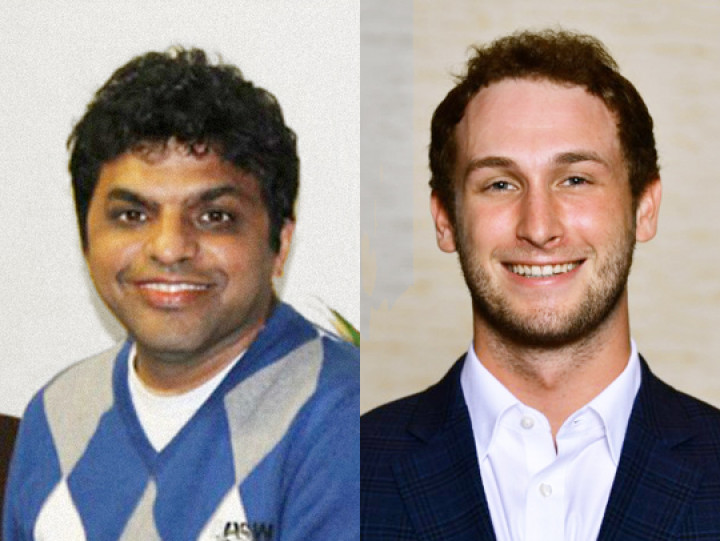“It Led to My Dream Job”
The University of Maryland’s Science Academy will celebrate its first cohort of students graduating with professional master’s degrees in machine learning and data science at the Spring 2021 Commencement ceremony. The Science Academy, which launched in 2019, offers graduate programs designed specifically for working professionals.
“The Science Academy did exactly what I was hoping for,” said one of the graduates, Adam Morra (B.S. ’17, mechanical engineering; M.P.S. ’21, machine learning). “I was an entry-level data scientist and machine learning engineer, and I was looking to take my career to the next level.”
When he enrolled in the machine learning program in 2019, Morra was an analytics and cognitive consultant. But last year, he was laid off due to the COVID-19 pandemic. Thanks to the skills he was learning in his courses, Morra quickly got a new job.
“During the master's program, I transitioned to a lead machine learning engineer position at a small consulting company where I was the main machine learning resource at my company, which was awesome,” he said.
Then, in February 2021, he took on a new role at the startup Domusys, where he is doing both mechanical engineering and machine learning.
“It's always been my dream to work for a startup and to apply machine learning,” Morra said. “This master’s program opened so many doors for me and it led to my dream job.”
One of Morra’s classmates, Manik Bali (M.P.S. ’21, machine learning), joined the Science Academy program to increase his skills and work more efficiently at his job. He’s a senior faculty specialist at UMD’s Earth System Science Interdisciplinary Center and the deputy director of the Global Space-based Inter-Calibration System (GSICS) coordination center at the National Oceanic and Atmospheric Administration (NOAA). Bali also took advantage of the tuition remission offered through his employment at UMD and part of his costs were covered through a NOAA and Joint Polar Satellite System grant.
“I signed up for the Science Academy because the courses offered a new perspective at solving complex data-driven problems,” Bali said. “If applied to my field of work, which is satellite Earth observation, climate studies, scientific programming and collaborative development, it can provide a paradigm shift in the manner in which these crucial problems are handled using classical techniques.”
At NOAA, Bali coordinates monitoring of weather satellites from over 15 space agencies across the world. New methods of data analytics on the cloud that he developed from ideas picked up from the Science Academy have led to new tools in a collaborative environment that are being used worldwide.
For instance, Manik is using a natural language processing-based machine learning technique to develop a tool that can extract information about weather satellites from authentic documents and place it on webpages in a format agreed upon by members of the satellite agencies. This would dramatically reduce the amount of staff time required to do the job now.
Using the knowledge he gained in his courses, Manik also developed a high-impact, cloud-based tool that can parse large documents, like meeting minutes from international meetings, and extract relevant summaries and action items and place them on the web. This tool is now used by GSICS satellite agencies worldwide.
“Tools like the one I developed have dramatically reduced the costs of coordination and have helped in enhancing a collaborative ecosystem within the GSICS community,” Bali said.
One of the most appealing aspects of the Science Academy for both Morra and Bali is that they were able to continue working while pursuing their master’s degrees.
“The program was designed for working professionals and they did a great job striking the right education and workload balance for working professionals,” Bali said.
When the data science and machine learning programs began in 2019, all of the courses were held in the evening on UMD’s College Park campus. After the COVID-19 pandemic hit, the courses went online but still kept their evening hours.
“The flexibility of being in a program where you can manage your work-life balance and still continue your education is what made me choose this program over other master's programs,” Morra said. “When searching for programs, everything I found was either online and designed for working professionals, or in-person and full-time. I really wanted the in-person experience and I was glad to get that with the Science Academy.”
As the Science Academy continues to grow, Bali and Morra are confident the program will continue to improve. Both have been given opportunities to offer their thoughts to help shape the program for the future.
“Amy Chester, the director of the Science Academy, and others who are coordinating the classes always ask for feedback and what they can do even better going forward,” Bali said. “I’m sure they will use that information to help the next batch of students.”
With their positive experiences coupled with the program’s goal to become even better going forward, both graduates confidently recommend the Science Academy to others. Morra has already recommended it to others, and Bali thinks it would be valuable for many working professionals.
“The knowledge that I’ve gained has been of immense use to me in my work,” Bali said, “and I’m sure it would be the same for others, too, whether in science or in management.”
Apply Now for Fall
Advance your career with a professional master’s degree in machine learning or data science from the University of Maryland. Apply by June 30 for fall admission. GRE not required.
Learn more: scienceacademy.umd.edu
Written by Chelsea Torres
The Department welcomes comments, suggestions and corrections. Send email to editor [-at-] cs [dot] umd [dot] edu.
